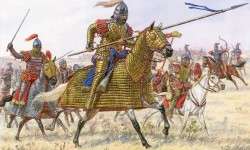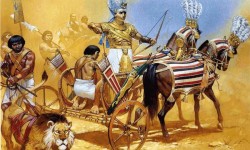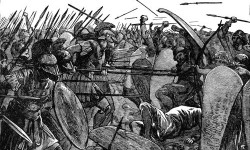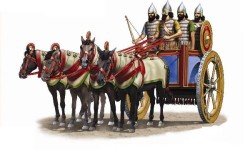King Philip II of Macedon developed after his takeover in 359 BC, the backward state of Macedonia within a short time to a leading power in Greece and laid the foundation for the future empire of his son Alexander of Macedon or known as Alexander the Great which is about Greece, the Middle East to India.
After the death of his father in 336 BC, Alexander took over the rule of Macedonia and shone by his military talent, his skill and his immense ambition.
This came to fruition not only in earlier years where he was already a battle-hardened commander of the Macedonian cavalry at 18, but also in his battle against the Persian army in western Anatolia. So he decided in 333 BC at a decisive battle at Issus victory for himself and opened with the defeat of the Persian army his empire the vastness of the eastern Mediterranean.
The following year, not only the cities of Tyros and Gaza fell under his command, but he was warmly welcomed and celebrated as a liberator by the Persians during the invasion of Egypt. At this time he also founded the city of Alexandria as the capital of his Egyptian empire. But Alexander was not satisfied with these areas. So he set his army in early 331 BC in the direction of Persia in march, where he was already expected by the Persian ruler Dareios at Gaugamela. Through the tactical clever use of his cavalry and elite infantry Alexander succeeded in a daring attack on the supreme superiority Dareios to rout and thus overwhelm the leaderless Persian army.
After the defeat of Gaugamela and the murder of Dareios by his satraps Alexander could not only claim the Persian throne for himself but consolidate his power and his empire over all Persia by 3-year campaigns. His expansion did not end until 326 BC. Although his troops won in the fight against Indian troops of King Poros at Hydaspes but his troops were then so weakened that they were no longer willing to march on to the east. Thus, Alexander had no choice but to start the homecoming, which was reflected in the passage through the Gedrosian desert as extremely lossy as thirsty thousands of soldiers. Weakened by the hardships and wounds, Alexander died in Babylon in 323 BC, although it is still unclear whether Alexander was poisoned.
After Alexander's death, the empire broke through the inheritance dispute of his Diadoches in three major dynasties:
- The Ptolemies in Egypt
- The Seleucids in Asia
- The Antigonids in Macedonia
These conflicts lasted for decades until almost the entire area was conquered later by the rising Rome.
You can find the right literature here:
Alexander: The Great Leader and Hero of Macedonia and Ancient Greece
Learn Essential Lessons in Leadership and Life from the Classic Tale of Alexander the Great! Have you heard of Alexander, but don't know his story? Do you remember some of his accomplishments, but wish you knew more? Do you need inspiration from Alexander's life to help you master your destiny? If so, then Alexander: The Great Leader and Hero of Macedonia and Ancient Greece is the book for you! This exciting story is broken into captivating chapters, such as: A World on Fire Persian Dismemberment The Sands of Syria In a Land of Pharaohs The Edge of the World The Merciful King Death of a Warrior This engrossing book also discusses the legacy of this famous man, including the many kingdoms and empires that grew out of his wake. You'll also learn how the Ancient Greek language, ideas, and culture were spread across the world - affecting us even today! Don't wait - gain the knowledge and wisdom of Ancient Greek history TODAY!
The Army of Alexander the Great (Men at Arms Series, 148)
When Philip II ascended the throne in 359 BC, Macedonia was in danger of being engulfed by wild barbarian tribes to the north and wily Greek cities to the south. Philip had to expand the power of the throne or be swallowed up: the creation of a powerful army was imperative. When his son, Alexander, inherited his kingdom at the age of 20, he also inherited an army which was truly unrivalled. The Macedonians were veterans of battle, well equipped and eager for conquest. Add to this Alexander's supreme gifts as military commander and it is little wonder they achieved so much.
Alexander the Great
The celebrated Macedonian king has been one of the most enduring figures in history. He was a general of such skill and renown that for two thousand years other great leaders studied his strategy and tactics, from Hannibal to Napoleon, with countless more in between. He flashed across the sky of history like a comet, glowing brightly and burning out quickly: crowned at age nineteen, dead by thirty-two. He established the greatest empire of the ancient world; Greek coins and statues are found as far east as Afghanistan. Our interest in him has never faded.
Alexander was born into the royal family of Macedonia, the kingdom that would soon rule over Greece. Tutored as a boy by Aristotle, Alexander had an inquisitive mind that would serve him well when he faced formidable obstacles during his military campaigns. Shortly after taking command of the army, he launched an invasion of the Persian empire, and continued his conquests as far south as the deserts of Egypt and as far east as the mountains of present-day Pakistan and the plains of India. Alexander spent nearly all his adult life away from his homeland, and he and his men helped spread the Greek language throughout western Asia, where it would become the lingua franca of the ancient world. Within a short time after Alexander’s death in Baghdad, his empire began to fracture. Best known among his successors are the Ptolemies of Egypt, whose empire lasted until Cleopatra.
In his lively and authoritative biography of Alexander, classical scholar and historian Philip Freeman describes Alexander’s astonishing achievements and provides insight into the mercurial character of the great conqueror. Alexander could be petty and magnanimous, cruel and merciful, impulsive and farsighted. Above all, he was ferociously, intensely competitive and could not tolerate losing—which he rarely did. As Freeman explains, without Alexander, the influence of Greece on the ancient world would surely not have been as great as it was, even if his motivation was not to spread Greek culture for beneficial purposes but instead to unify his empire. Only a handful of people have influenced history as Alexander did, which is why he continues to fascinate us.
Alexander the Great An Illustrated Military History

Alexander the Great An Illustrated Military History: The rise of Macedonia, the battles, campaigns and tactics of Alexander, and the collapse of his ... death, depicted in more than 250 pictures Paperback – February 16, 2012
A magnificent illustrated military history of Alexander The Great: covering the rise of Macedonia, the battles, campaigns and tactics of Alexander, and the collapse of his vast empire after his early death, all depicted in more than 250 pictures.
This post is also available in:
 Deutsch (German)
Deutsch (German)  Français (French)
Français (French)  Italiano (Italian)
Italiano (Italian)  简体中文 (Chinese (Simplified))
简体中文 (Chinese (Simplified))  Русский (Russian)
Русский (Russian)  Español (Spanish)
Español (Spanish)  العربية (Arabic)
العربية (Arabic)



















